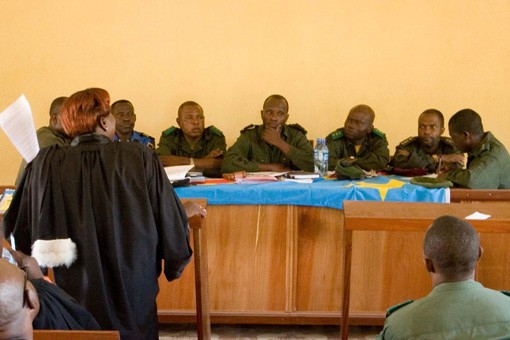Photo: War crimes trial of Captain Blaise Bongi, Military Garrison Court of Ituri at Bunia. Bongi was found guilty in 2006, but escaped from prison in 2007. Court-ordered compensation has not been paid. GODE MPIANA/Justice Plus
KINSHASA, February 21, 2013 — “Judgment Denied,” a report from the International Center for Transitional Justice (ICTJ), details four military court cases in the Democratic Republic of the Congo (DRC) involving dozens of victims, egregious human rights violations, and nearly $1 million in outstanding awards owed by the government.
In every case, serious crimes were committed against civilians by members of the Congolese Army, but the government has yet to pay compensation ordered by the courts.
As the ICTJ report explains, the government’s failure to act has wide implications for victims and communities in the Central African country, which has been plagued by violence for many years. Not only do victims continue to experience hardships stemming from human rights violations, but the situation has shattered their confidence in the justice system and perpetuated a climate of impunity that fuels ongoing abuses.
“Forcing the Congolese government to pay for crimes committed by the army could go far in driving desperately needed measures to prevent abuses being committed today in Eastern Congo,” says Sharanjeet Parmar, head of office for ICTJ’s DR Congo program.
A case examined in the report is the “Looting of Mbandaka.” In early July 2005, Congolese soldiers stationed near Mbandaka looted houses and shops in the city, and carried out violent attacks against people on the street.
In 2007, the Military Court of Mbandaka confirmed the convictions of eight soldiers, including three for crimes against humanity, and ordered the government to pay victims US$126,000. These convicts have reportedly since escaped from prison, and claimants have yet to be paid any compensation.
Charlotte is one of 25 victims who brought the case to court.
She recalls how during the lootings, a group of soldiers forced their way into her home and repeatedly raped her in front of her two daughters. Trying to stop them, the girls offered the soldiers US$60 – all of the family’s savings. The men took the money and left.
Today, Charlotte’s life continues to be an ordeal. Having never received medical treatment for the attack, she continues to experience debilitating health problems. She also suffers shame and rejection by her community as a rape survivor. Accused of having become “a military wife,” her husband threw her out of her home. She now lives in abject poverty and struggles to support her five children.
The belief that the 2007 Mbandaka judgment had finally brought justice for victims is now nearly gone.
“Undertaking reparations at the national level is more urgent than ever,” says Ruben Carranza, director of ICTJ’s Reparative Justice program. “By implementing the judgments of its own courts, the Congolese state acknowledges what these women and their families went through. It also sends a signal to other survivors in the DRC that their rights have meaning."
“Justice Denied” recommends establishing an independent judicial mechanism to oversee payments of outstanding court-ordered reparations. It also proposes that the ministries of Justice, Budget, and Finance undertake regulatory steps immediately in order to effectuate payments, at the national and provincial level.
According to ICTJ, the international donor community must also act. The report recommends linking development aid for justice and security sectors to payment of outstanding reparations orders, and deeper institutional reforms.
“The renewed cycle of war and violence in Eastern Congo is linked to the systemic failure of the Congolese state to reform itself and protect the civilian population,” explains ICTJ’s Africa director, Dr. Suliman Baldo. “The international community can no longer look on. To make national reparations a reality, political support and capacity-building resources need to be offered.”
The ICTJ report, available in both English and French, explains how implementing reparations payments will go far in restoring victims’ trust in the law and the state. “Why have we exposed our shame and disgrace in a public process only to be abandoned without relief?” decries Charlotte. “Pay back what we have lost – we too have the right to live.”
About ICTJ
The International Center for Transitional Justice works to redress and prevent the most severe violations of human rights by confronting legacies of mass abuse. ICTJ seeks holistic solutions to promote accountability and create just and peaceful societies. For more information, visit www.ictj.org
Contacts
Kinshasa: Sharanjeet Parmar, ICTJ Head of Office, DRC E-mail: sparmar@ictj.org Phone: +243 81 3165202
New York: Refik Hodzic, Director of Communications E-mail: rhodzic@ictj.org Phone: +1 917 975 2286
Learn more: Listen to a podcast interview with Ruben Carranza on reparations in the DRC A French version of this press release is available here
